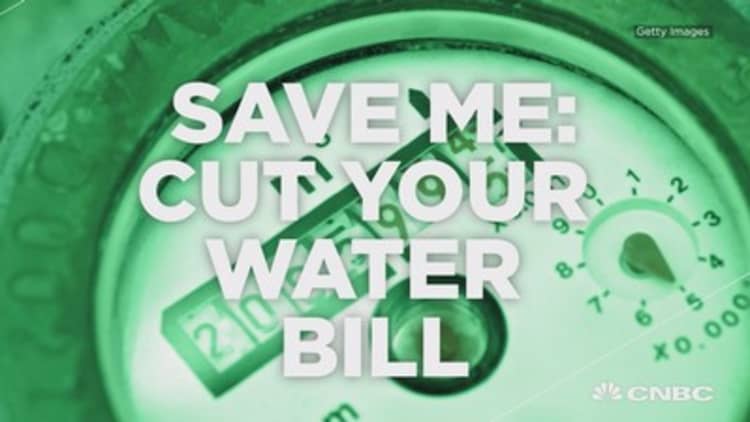
Electric bills get plenty of focus once it's warm enough for air conditioners to click on, but this summer, it's smart to pay attention to the water bill, too.
All but six states currently have areas experiencing short- or long-term drought conditions, ranging from "abnormally dry" to "exceptional drought," according to U.S. Drought Monitor data from the University of Nebraska-Lincoln's National Drought Mitigation Center. If that's not impetus enough to start conserving, Circle of Blue's Price of Water 2015 report estimates the average monthly cost for a family of four using 100 gallons of water per person per day is up 6 percent compared with last year. The water portion alone can be as high as $150 in some major cities; combined with sewer and stormwater charges, they found, some households are paying more than $300 a month.
Read MoreHow to avoid sky-high summer concert ticket prices
"Water efficiency is starting to rival energy efficiency in terms of awareness," said Dan DiClerico, senior home editor for Consumer Reports. Prospective homebuyers now often ask to see a property's water bill as well as its electric bill, he said, to avoid (or at least be forewarned of) the shock value of exorbitant water charges.
Changing your behavior can yield some easy savings—even if you're not willing to cut your shower time in half or wash vegetables in a pot instead of the sink, so you can recycle the water for thirsty houseplants. (Both tricks make appearances on tips lists from Save Our Water and Water Use It Wisely, among other resources.) One easy switch: Scrape, rather than rinse dishes, said Melissa Fiffer, appliance product manager for the government's Energy Star program. Rinsing wastes 1,129 gallons of water a year. Washing only full loads in the dishwasher or clothes washer is another fast fix to save water—to the tune of 1,000 gallons a year.
Read MoreSpend less on the airline fees travelers love to hate
Be on high alert for leaks. "American homes can waste, on average, more than 10,000 gallons of water every year due to running toilets, dripping faucets, and other household leaks," said Veronica Blette, who heads the government's WaterSense program. A suddenly spiking water bill is one cue, or you might check your water meter before and after a two-hour period in which you don't use water. If the meter is higher, there's a leak somewhere.
Strategically updating appliances and home systems can also yield results, said DiClerico. "A really excellent low-flow, efficient toilet can be had for $100," he said. Depending on when that fixture was last updated, you might be reducing water use from 6 gallons per flush to as low as 1.28, he added. Energy Star-rated standard dishwashers use 25 percent less water than those meeting the federal minimum, Fiffer said.
Read MoreFor a better auto insurance rate, just ask
But be sure to check out ratings and reviews before you buy any water-efficient appliance. Certain features, like a soil sensor in dishwashers and clothes washers, can make some models an even better buy. "They basically measure how much dirt is in the water, and they'll stop washing the dishes or the clothes when they're clean," DiClerico said. Ratings can also warn you of a purchase that wastes, rather than saves water. "It can backfire if they don't work," he said—say, if that toilet requires flushing twice, or a low-flow showerhead means spending more time in the shower for a thorough rinse.
Look for rebates, too. Plenty of water utilities offer them on water-efficient upgrades that can greatly reduce, or even entirely cover, the cost of the upgrade. Citrus County Utilities in Florida currently offers $100 for homeowners installing a WaterSense toilet, for example, while the City of Gillette in Wyoming offers up to $25 on purchases of low-flow fixtures and the City of Charlottesville, Va., has a $30 rebate on rain barrels. Energy companies are more apt to have rebates that cover energy- and water-efficient appliances; Baltimore Gas and Electric, for example, has offers of $75 to $100 on clothes washers.


